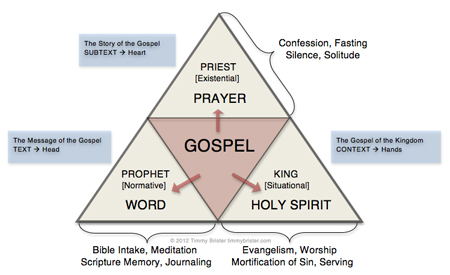THEOLOGY OF SPIRITUAL GIFTS: the general authority of every believer to minister
Every believer is a prophet, a priest, and a king.
We are all prophets (Joel 2:28-29; Acts 1:24). Every believer is to exhort (Heb.3:13), counsel (Rom. 15:14), evangelize (Acts 8:4) and teach (Col. 3:16) with the word ‘dwelling richly’ within. Believer, you must speak!
Every believer is a priest (I Pet.2:9). We all have access to the presence of God, as did the priests of old (Matt. 27:51; Heb. 4:14-16), and have the responsibility to offer spiritual sacrifices and deeds of mercy (Rom. 12:1-2; Heb. 13:12,16). Believer, you must serve!
Every believer is also a king (Rev. 1:5,6). We all have authority over the world (1 John 5:4), over the flesh (Rom.6:14ff), and over the devil (Luke 10:20). We all have divine weapons to demolish strongholds and obstacles to the kingdom of Christ (2 Cor. 10:4-5). Believer you must take charge!
This doctrine is called the ‘universal office’ of believer, and it is nothing short of revolutionary. A layperson ministers in word (as a prophet) and deed (as a priest), and need not wait for a pastor to request it (because he is a king). Jesus himself said that the least in the kingdom of God is greater than John the Baptist (Matt.11:9-11). Who can outrank an ‘ordinary’ Christian? No one! So we see that every lay person1 has the responsibility to initiate, to plan, to guide and to manage ministries of both word and deed. Lay people must not be passive.”2
Tim Brister3 provides a related visual on loving God and others with our head, hearts and hands (corresponding to prophets-priests-kings, respectively:
- “Lay person” is shorthand for those who are not “clergy,” that is are not the paid professional ministers Ie.g., pastors) in the local church. Almost everyone is a “layman” or “lay person,” and they the high calling of serving and even leading in the church and the world. ↩
- Tim Keller, “THEOLOGY OF SPIRITUAL GIFTS: the general authority of every believer to minister,” in ROMANS Leaders Guide (thanks to my friend Kent Blair for sharing this quote) ↩
- “Why I Employ the Triperspectival Framework for Gospel-Centered Spiritual Formation” ↩



